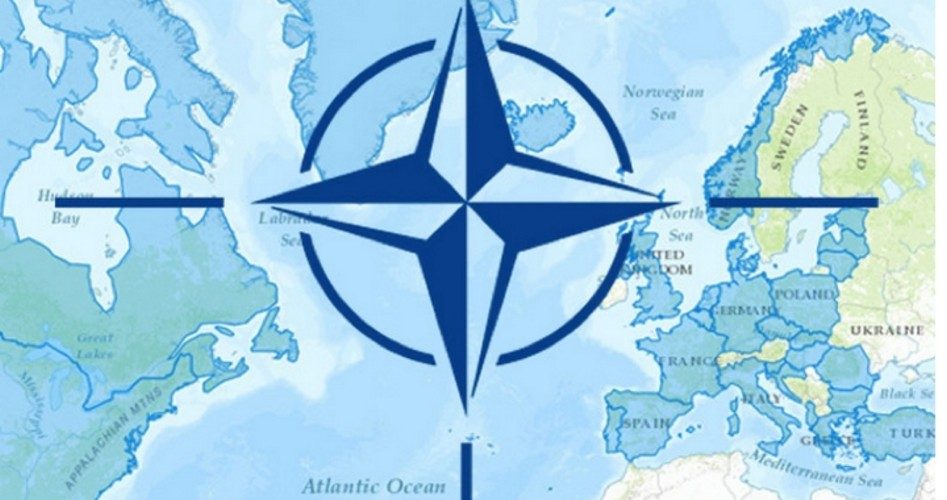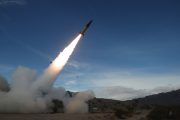
During a lengthy interview with the editorial board of the Washington Post on March 21, presidential candidate Donald Trump revealed the names of a team chaired by Senator Jeff Sessions (R-Ala.) that is advising him on foreign affairs. They are Keith Kellogg, Carter Page, George Papadopoulos, Walid Phares, and Joseph E. Schmitz.
Another key point of discussion during the Trump interview with the Post was the candidate’s views on the U.S. role in NATO, which he criticized mainly on economic grounds, as he suggested reduced American participation. “We certainly can’t afford to do this anymore,” Trump said, adding later: “NATO is costing us a fortune, and yes, we’re protecting Europe with NATO, but we’re spending a lot of money.”
However, Trump stopped short of advocating U.S. withdrawal from NATO, saying:
No, I don’t want to pull [the United States] out. NATO was set up at a different time. NATO was set up when we were a richer country. We’re not a rich country. We’re borrowing….
I think the distribution of costs has to be changed. I think NATO as a concept is good, but it is not as good as it was when it first evolved.
Trump’s main objection to NATO is evidently not the way the alliance tends to entangle the United States in Europe’s affairs, but only that it “isn’t fair” and that “we’re not reimbursed fairly for what we do.” He said this lack of fairness also applies to our defense commitment to South Korea, which he described as “very rich.” “And yet, we’re not reimbursed fairly for what we do [for Korea]. We’re constantly … sending our ships, sending our planes, doing our war games. We’re reimbursed a fraction of what this is all costing.”
The Post reported that “Trump outlined an unabashedly noninterventionist approach to world affairs,” but although it was refreshing to see that term in print in one of the nation’s most influential newspapers, it was an exaggeration of Trump’s position. A writer for RedAlertPolictics.com even suggested that Trump “is a lot closer [to] the ideology of non-interventionists like Sen. Rand Paul (R-KY) and his father former Rep. Ron Paul than former President George W. Bush.”
This publication has for years used the term “non-interventionist” as an apt description of the Pauls, especially former Representative Ron Paul — whom the mass media long inaccurately branded as an “isolationist.”
As for an accurate definition of “noninterventionist,” Paul offered one in a December 2011 interview with CNN correspondent Wolf Blitzer, who asked him: “Tell our viewers right now, once and for all, the difference between an isolationist and a non-interventionist.”
Paul replied:
An isolationist is a protectionist that builds walls around their country, they don’t like the trade, they don’t like to travel about the world, and they like to put sanctions on different countries. So some of the people who call me that, are actually much more in favor of sanctions and limited trade. They’re the ones who don’t want to trade with Cuba and they want to put sanctions on anybody who blinks their eye at them. And yet, the opposite is what we believe in….
So non-intervention is quite a bit different since what the Founders advised was to get along with people, trade with people, and to practice diplomacy, rather than having this militancy of telling people what to do and how to run the world and building walls around our own country. That is isolationism. It’s a far cry from what we believe in.
The guiding principle of the noninterventionist has always been found in the words of John Quincy Adams, who said in a July 4, 1821, speech:
Wherever the standard of freedom and Independence has been or shall be unfurled, there will [America’s] heart, her benedictions and her prayers be. But she goes not abroad, in search of monsters to destroy. She is the well-wisher to the freedom and independence of all. She is the champion and vindicator only of her own.
In his interview with the Post, Trump said, “I think NATO as a concept is good, but it is not as good as it was when it first evolved,” and “we’re protecting Europe with NATO,” only complaining that “we’re spending a lot of money.”
If we contrast that statement with what noninterventionist Ron Paul said on the Alan Colmes Show last year, we can see that Trump’s and Paul’s positions are miles apart.
When Colmes asked Paul: “You also believe NATO should be shut down at this point, correct?” Paul replied:
Yeah, NATO for me is one of those entangling alliances that our Founders suggested we not get involved in. And, you know, Robert Taft was from the Old Right, which was more libertarian. Under the circumstances following World War II, he advised us not to get into NATO because it would invite more problems. And I think NATO is part of the reason we go into Libya, into Syria, now in Ukraine. And that’s all under NATO, It’s really not checking in with the American people whether it’s a good idea or not. I think that NATO’s an entangling alliance that we would be better off without.
This concept of NATO as an entangling alliance was explained in more detail in “NATO: A Military Entangling Alliance,” an article by John F. McManus, president emeritus of The John Birch Society, posted recently by The New American. Among the other key points included in his article, McManus noted:
Created in 1949, NATO was sold to the Congress and the American people as a military force able to block any additional conquests of the Soviet Union. Its real purpose was to place the forces of several nations under United Nations control. From its outset, the alliance has derived its legitimacy from Articles 51-54 of the United Nations Charter. It is and always has been a UN “regional arrangement,” a UN subsidiary.
Trump is obviously concerned about the financial burden our interventionist foreign policy has placed on the United States and his call for our allies to shoulder more of that burden — and also to refrain from “nation-building” — could be viewed as a step in the right direction. He said during an address on foreign policy on March 21 before the American Israel Public Affairs Committee:
I do think it’s a different world today, and I don’t think we should be nation-building anymore. I think it’s proven not to work, and we have a different country than we did then. We have $19 trillion in debt. We’re sitting, probably, on a bubble. And it’s a bubble that if it breaks, it’s going to be very nasty. I just think we have to rebuild our country.”
There is much common sense in what Trump said. But the question remains, if we were truly following the advice of our nation’s early leaders, such as George Washington, Thomas Jefferson, and John Quincy Adams, who advocated, respectively, “to steer clear of permanent alliance with any portion of the foreign world”; “honest friendship with all nations-entangling alliances with none”; and “[go] not abroad, in search of monsters to destroy” would we ever become part of a permanent alliance such as NATO?
If being a noninterventionist is defined as adherence to those sentiments, then Ron Paul would qualify. As for Trump, the Post said, “He advocates a light footprint in the world.”
Perhaps then, a new term might be coined to describe Trump: interventionist-lite.
We should also review the foreign policy advisors that Trump just tapped to help him put together his foreign policy:
• Walid Phares, whom Trump has described as “a counterterrorism expert.” Phares is a professor at the National Defense University, who has testified on Capitol Hill about the Middle East and international security. Since 2007, he has served as an expert on terrorism and the Middle East for Fox News. Prior to that, from 2003 to 2006, Phares was a terrorism expert for NBC.
• Carter Page is an energy industry executive and head of his own firm, Global Energy Capital. He was formerly an investment banker at Merrill Lynch. He is the only advisor on Trump’s list who is a member of the internationalist Council on Foreign Relations (CFR), where he was previously an International Affairs Fellow and co-director of the CFR’s study group on energy development in the Caspian Sea region. He has also been a fellow at the Center for National Policy (CNP) since 2010 where his work has focused on energy policy and strategic trends across the sector. The CNP has historically been heavy with “insider” types, including its former chairman, Leon Panetta, who was both secretary of defense and CIA director in the Obama administration, White House chief of staff under Bill Clinton. Previous presidents and chairmen of CNP include three former U.S. secretaries of state: Madeleine Albright, Edmund Muskie, and Cyrus Vance.
• George Papadopoulos is a former advisor to Ben Carson, who directs the London Centre of International Law Practice’s center on international energy law and security.
“He’s an oil and energy consultant,” Trump said. “Excellent guy.”
• Joseph E. Schmitz is a former Department of Defense inspector general who now runs a consulting firm. He was a special assistant to Attorney General Edwin Meese III during the Reagan administration.
Schmitz’s father, John G. Schmitz, was a Republican member of Congress from California and the American Party’s candidate for president in 1972. The elder Schmitz’s 1972 presidential campaign platform was succinct and might make a good one for Trump if his son could convince Trump to recycle it: (1) In foreign affairs, America should always treat its friends better than its enemies; (2) Never go to war unless you plan on winning; and (3) Those who work ought to live better than those who won’t.
Keith Kellogg, the final name on Trump’s list, is a former lieutenant general in the Army, who is now vice president of strategic initiatives at Cubic Corporation in Virginia. During his military career, Kellogg was chief operating officer of the Coalition Provisional Authority in Baghdad, Iraq. He also served as Commander of the 82nd Airborne Division and worked for the Joint Chiefs of Staff as director for all computing and communications for U.S. forces.
“And I have quite a few more,” Trump told the Post. “But that’s a group of some of the people that we are dealing with.”
Related articles:
Mexico Now Joining Anti-Trump Forces
Trump, Cruz, and the Establishment
Cruz’s New National Security Team Includes Establishment Insider Elliott Abrams
WSJ/NBC Poll: “Anti-Interventionist Current … Sweeps Across Party Lines”
“The Neo-Conservative Era Is Dead”: Ron Paul Institute for Peace and Prosperity
Romney’s Foreign Policy: Bush/Obama Redux



